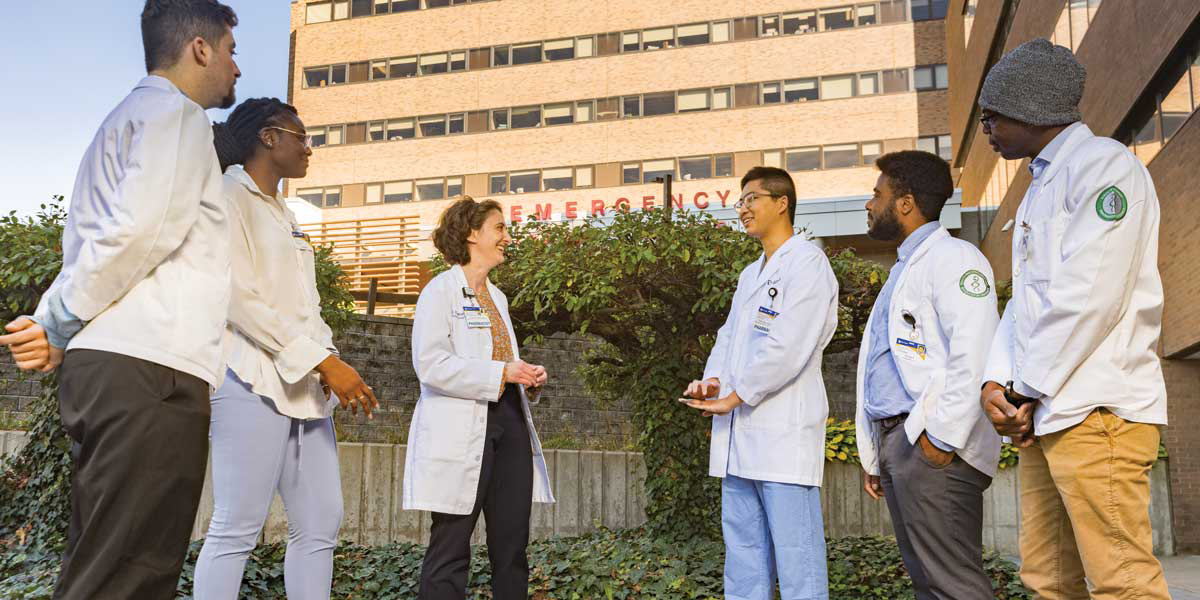Building castles in the air
Residency program director emphasizes lifelong learning

If you have built castles in the air, your work need not be lost; that is where they should be. Now put the foundations under them.”
It’s been decades since she uttered these famous words by Henry David Thoreau in her valedictory speech at Bainbridge-Guilford High School, but they still hold true for Karen Williams. As program director of the PGY1 (post-graduate year one) pharmacy residency program at Guthrie Robert Packer Hospital in Sayre, Pa., she believes in making big dreams a reality for the early-career pharmacists under her charge.
“I have this vision of the castle in the air, the thing that we’re trying to reach, where they are an advanced practice practitioner who can function well at a very high level, taking care of patients,” says Williams. “I think most of my professional work is spent putting the foundation under that and making that something that everybody can achieve.”
When Williams found out that Binghamton University would be opening the School of Pharmacy and Pharmaceutical Sciences (SOPPS), she believed that the school would elevate the level of practice in the community.
“We were starting our residency program at the same time Binghamton matriculated its first class,” says Williams. “So it was a unique relationship that we developed, because we very early realized that we could help each other and support each other in our goals.
“We really wanted to advance the level of our practice,” she adds. “We wanted to explore innovative ways to layer students and learners into our practice. And, of course, the school really needed a place to train its students. Obviously, it’s a win-win if you’re able to have great practice sites and great care happening in those places.”
Williams and her team help SOPPS students learn the skills and progress through the levels of learning so that they can demonstrate and perform the tasks of a pharmacist.
“They come in not really understanding or not knowing necessarily how to put those pieces together and provide that care,” says Williams. “But we teach them how to efficiently collect data, look for drug-related problems, find solutions for those problems, and then communicate the problems and the solutions to the care team and, together with the care team, come up with the best next steps for patients.”
Students in their last year of pharmacy school do a series of back-to-back, five- to six-week rotations throughout the year. For example, on Friday, they may go to one site and Monday morning show up at a different site and start a new rotation.
“Maybe you’re inpatient for a couple of rotations, maybe you’re in retail pharmacies for a couple of rotations,” says Williams. “Maybe you do something virtual where you’re working with a pharmacy benefit manager and developing protocols or policies for the insurance company. So really, this year of experience is sampling.”
While doing a residency is not a professional requirement for pharmacists, Williams considers it a professional necessity.
“We’ve realized that students are coming out without the level of expertise to be able to practice high-level care without that year of residency,” says Williams. “To get a lot of those higher-level, direct patient-care jobs, more and more, students really need that extra year of training.”
Rachel Klosko, a clinical assistant professor at SOPPS, is a preceptor at Guthrie. She calls her colleague a role model for fellow pharmacists, residents, students and other medical staff at her institution.
“She is able to show students that no pharmacist knows everything, and we need to continually cultivate that passion for lifelong learning to provide the best patient care,” Klosko says.
Williams might do a lot, but she’d never admit to knowing it all. Every day is an opportunity to learn something new, she says.
“You never know everything and most of the time you don’t know what you don’t know,” Williams says. “It’s really important to keep your brain open and be accepting of those things that are going to make you better. And that is sort of where professional development comes in. Because I think you have to actively work at ensuring you are improving.”

